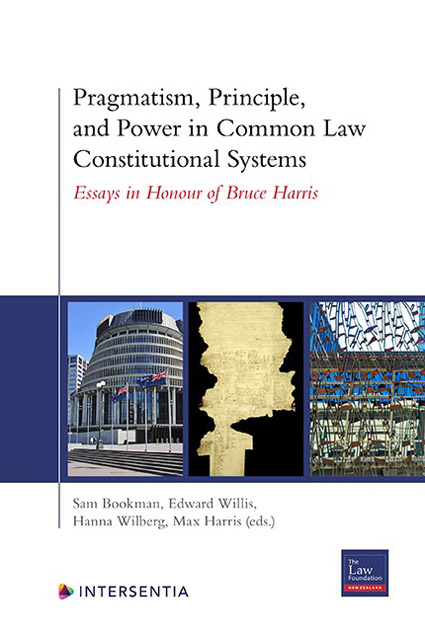 Pragmatism, Principle, and Power in Common Law Constitutional Systems
Pragmatism, Principle, and Power in Common Law Constitutional Systems Book contents
- Frontmatter
- Foreword
- Preface
- Contents
- The Writings of Professor Bruce Harris
- List of Cases
- List of Contributors
- Introduction
- Part I The Nature of Executive Power
- Part II Issues Concerning The Judiciary: The Nature of Judicial (and Executive) Power
- Part III Issues Concerning The Judiciary: Creativity and Pragmatism in Judicial Method
- Part IV Issues Concerning The Judiciary: Judicial Appointment and Accountability
- Part III The Nature of Unwritten Constitutions and Their Future
- Index
The Constitutional Status of the Senior Judiciary and the Courts in New Zealand: A Sketch
Published online by Cambridge University Press: 19 November 2022
- Frontmatter
- Foreword
- Preface
- Contents
- The Writings of Professor Bruce Harris
- List of Cases
- List of Contributors
- Introduction
- Part I The Nature of Executive Power
- Part II Issues Concerning The Judiciary: The Nature of Judicial (and Executive) Power
- Part III Issues Concerning The Judiciary: Creativity and Pragmatism in Judicial Method
- Part IV Issues Concerning The Judiciary: Judicial Appointment and Accountability
- Part III The Nature of Unwritten Constitutions and Their Future
- Index
Summary
INTRODUCTION
Sir Geoffrey Palmer has expressed the view that ‘the New Zealand judiciary is an understudied institution’. I agree wiThthat evaluation, and am very pleased to have this opportunity to add incrementally to judiciary studies as part of this tribute to the career and work of Bruce Harris. The invitation to contribute also affords an opportunity to respond, however belatedly, to the plea of the Hon Justice John Priestley in the Henry Harkness Lecture, when he said:
As a group, the New Zealand judiciary find it difficult to explain or defend its constitutional role and its importance. Occasional champions are needed. Who better than the legal profession, legal academics, and (rarely I fear) a well-informed media.
As my title of this contribution suggests, I am concerned here with the position of the courts as well as the status of the judiciary. The two topics are interrelated in rather complicated ways, but my thesis of this contribution is that because of this interconnection, the judges are quite widely perceived as being, without more, a species of civil servant. This chimes wiThthe remarks of the former Chief Justice, Dame Sian Elias, who expressed related sentiments concerning the status of the courts:
the courts … are not seen as standing apart from the whole of government effort. They are not seen as a separate institution of government
What Dame Sian complains of, in effect, is that the separation of powers, the set of common law constitutional principles that seeks to treat the legislature, the executive and the judiciary as separate institutions, is not being fully respected in the New Zealand context, at least so far as the judges are concerned. Justice Priestley made a similar complaint, referring to an incident when he was identified on a name-plate at a seminar as ‘Justice John Priestley from the Ministry of Justice’. His point was that ‘a judge is … part of an arm of government, independent, and performing a vital constitutional role’, rather than a civil servant, which his maladroit labelling implied if not asserted. The significance of the point is, in the words of Professor Aileen Kavanagh that:
The independence of the courts ensures that they will not become the mere instrument of the executive or legislative branch when adjudicating disputes about what the law requires. It enables them to resist pressure from those other branches, thus strengthening their ability to uphold the rule of law.
- Type
- Chapter
- Information
- Pragmatism, Principle, and Power in Common Law Constitutional SystemsEssays in Honour of Bruce Harris, pp. 217 - 244Publisher: IntersentiaPrint publication year: 2022


